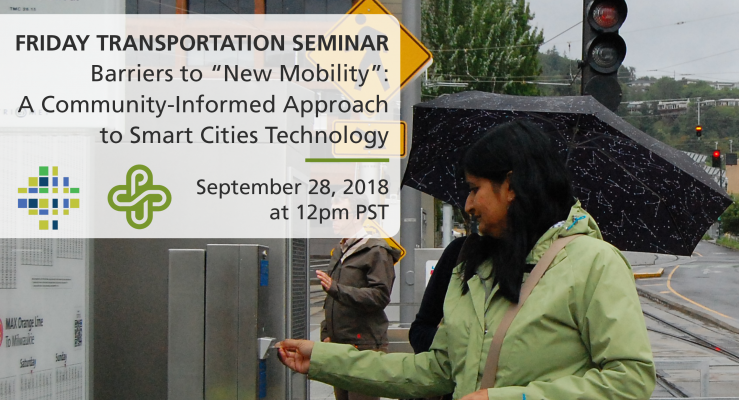
Friday Transportation Seminars at Portland State University have been a tradition since 2000. With over 450 seminars presented and recorded (access the archive of seminars here), we host both visiting and local scholars to share the latest in research, technology, and implementation in transportation.
WATCH THE RECORDED VIDEO
PRESENTATION SLIDES
Miss this seminar or want a look back? You can view the presentation slides here.
EVENT OVERVIEW
There is an active debate about the potential costs and benefits of emerging “smart mobility” systems, especially in how they will serve communities already facing transportation challenges. This presentation will describe the results of an assessment of these equity impacts in the context of lower-income areas of Portland, Oregon, based on a mixture of quantitative and qualitative research.
Portland, Oregon’s proposal for the U.S. Department of Transportation’s Smart City Challenge, “Ubiquitous Mobility for Portland,” focuses on developing mobility solutions that would serve traditionally underserved populations (low-income, communities of color, and residents with mobility challenges). This study found that by lowering costs and improving service for public transit, ridesharing and active transportation, smart mobility systems could address many of the needs of transportation disadvantaged communities. Significant barriers exist, however, which prevent smart mobility technologies from benefiting all communities. For example, lower income survey respondents and respondents of color had significantly lower access to drivers’ licenses, bank accounts and credit cards, and also rely more heavily on paying cash for transit tickets. Lower income respondents and respondents of color had lower access to Internet at home and work and were more likely to reduce data use or cancel cell plans because of cost or data restrictions. Respondents were also concerned about information security, as the impacts of loss or theft, especially identify theft, can be devastating for lower-income residents.
Since integrating payment systems and relying on Internet and cell data for mobile applications is a core feature of smart mobility systems, these disparities are significant barriers to the equitable transition to smart mobility. Policy recommendations to address equity include expanding free and public WiFi, better real-time transit information, improved training, and language translation for phone applications, among other things.
KEY LEARNING OUTCOMES
- An overview of smart mobility solutions;
- An understanding of the existing barriers that currently prevent these smart mobility solutions from benefiting all communities;
- Specific recommendations to address and overcome these barriers.
THE RESEARCH
This seminar is based on research "Community-Based Assessment of Smart Transportation Needs in the City of Portland" funded by the National Institute for Transportation and Communities (NITC). Read about the project here.
SPEAKERS
Aaron Golub, Portland State University
 Aaron Golub is an associate professor in the Toulan School of Urban Studies and Planning at Portland State University (PSU), moving to PSU after eight years at Arizona State University and ten years studying and working in the San Francisco Bay Area. His work focuses on the social contexts of urban transportation systems, explored in three ways: 1. the effects on social equity of current transportation planning practices – how people participate in planning, and who wins and loses from transportation plans, 2. planning, research and advocacy in support of alternatives to the automobile (especially public transportation and bicycles), and 3. the historical roots of automobile dependence in the United States. At PSU, Dr. Golub teaches courses on urban transportation policy, planning research methods, transportation finance and public transportation.
Aaron Golub is an associate professor in the Toulan School of Urban Studies and Planning at Portland State University (PSU), moving to PSU after eight years at Arizona State University and ten years studying and working in the San Francisco Bay Area. His work focuses on the social contexts of urban transportation systems, explored in three ways: 1. the effects on social equity of current transportation planning practices – how people participate in planning, and who wins and loses from transportation plans, 2. planning, research and advocacy in support of alternatives to the automobile (especially public transportation and bicycles), and 3. the historical roots of automobile dependence in the United States. At PSU, Dr. Golub teaches courses on urban transportation policy, planning research methods, transportation finance and public transportation.
 Vivian Satterfield is a community organizer and policy shaper using a racial justice lens at the intersections of transportation, housing and health. She works as the VP of research for Verde Northwest, and prior to that she was deputy director of OPAL Environmental Justice Oregon, a community organizing and advocacy organization working with low-income and communities of color to educate, engage and empower.
Vivian Satterfield is a community organizer and policy shaper using a racial justice lens at the intersections of transportation, housing and health. She works as the VP of research for Verde Northwest, and prior to that she was deputy director of OPAL Environmental Justice Oregon, a community organizing and advocacy organization working with low-income and communities of color to educate, engage and empower.
PROFESSIONAL DEVELOPMENT
This 60-minute seminar is eligible for 1 hour of professional development credit for AICP (see our provider summary). We provide an electronic attendance certificate for other types of certification maintenance.
LEARN MORE
Sign up for our newsletter to receive monthly updates.
